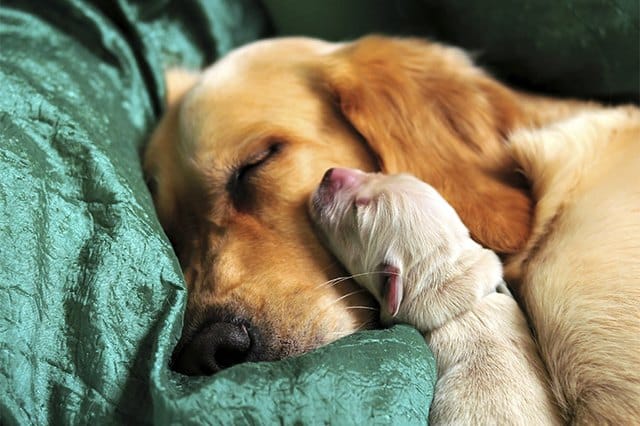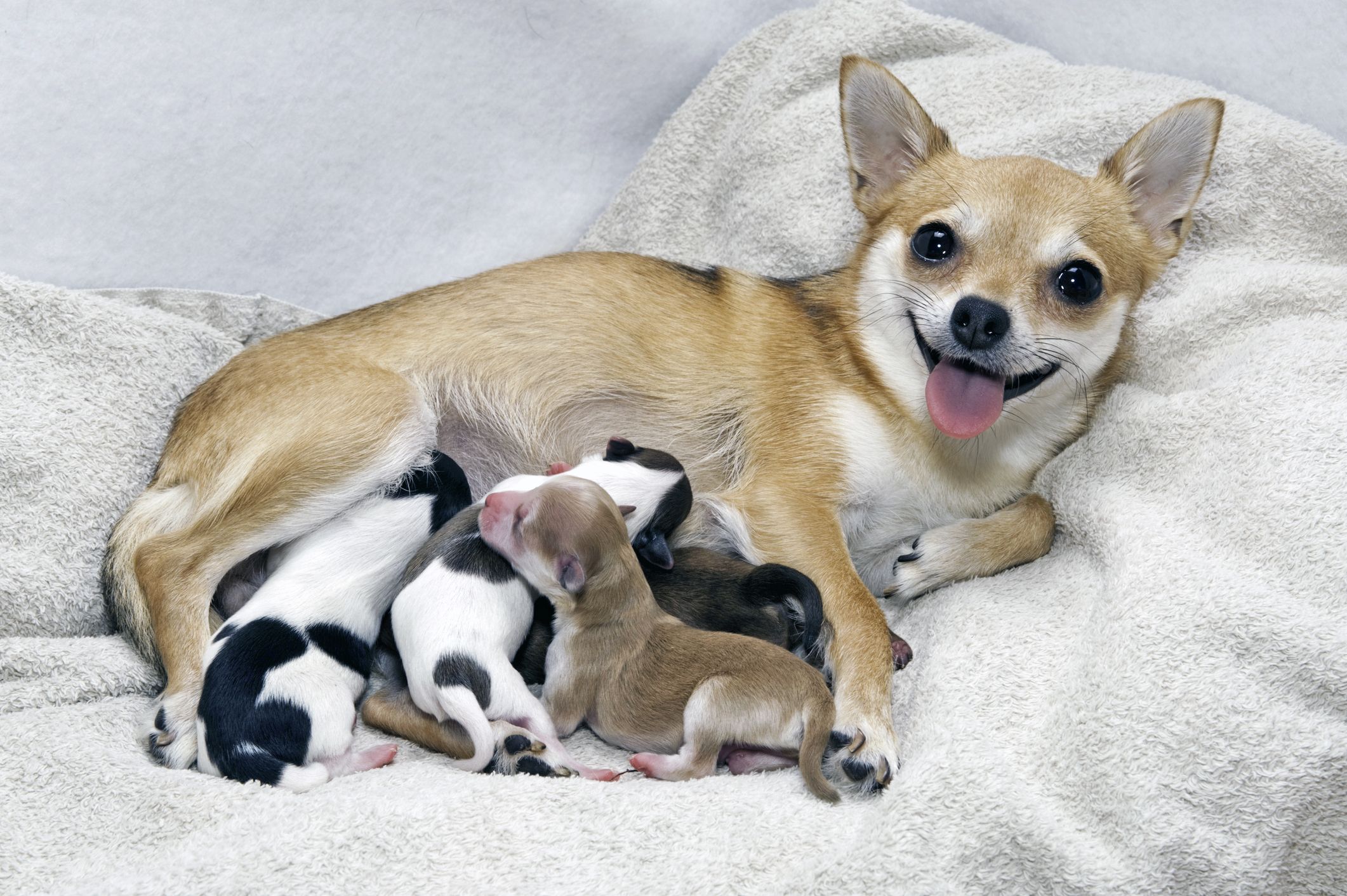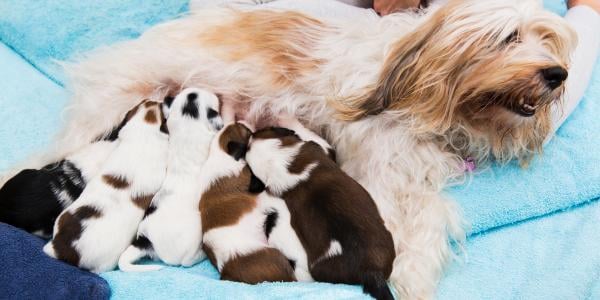Imagine the heartwarming sight of a mother dog nursing her adorable puppies, their tiny bodies nestled against her warm fur. It's a beautiful bond that evokes nurturing and protection. But what happens when the mother needs to leave her puppies for a while? How long can she be away without causing harm or distress? In this article, we'll explore the delicate balance between a mother dog's needs and the well-being of her puppies. Discover the surprising answer to this common question, providing guidance for dog owners and a deeper understanding of the canine maternal instinct.

This image is property of img.cutenesscdn.com.
The Importance of Mother-Dog Bonding
Mother-dog bonding is a crucial aspect of a puppy's early development. During the initial bonding period, the mother dog establishes a deep connection with her offspring, laying the foundation for their emotional, social, and physical well-being.
The initial bonding period
The initial bonding period between a mother dog and her puppies typically occurs immediately after birth. This is a critical time when the puppies rely on their mother for warmth, nourishment, and protection. During this period, the mother dog stimulates their puppies to urinate and defecate by licking their bellies, ensuring their cleanliness and hygiene. It is a time of intense nurturing and care, where the mother establishes her role as the primary caregiver and protector.
Nurturing and socialization
Mother-dog bonding goes beyond physical care and extends to the puppies' socialization. The mother dog plays a vital role in teaching her puppies important skills such as proper canine behavior, effective communication, and appropriate social interactions. Through gentle play and correction, she helps them develop crucial social skills, enabling them to navigate their environment and interact successfully with humans and other animals.
Emotional development of puppies
The emotional well-being of puppies is closely intertwined with their mother-dog bonding. The mother's gentle presence and nurturing behaviors provide comfort and security to the puppies, helping them develop a strong foundation of emotional resilience. As the puppies explore their surroundings, their mother's consistent and reassuring presence serves as a source of stability and confidence.
Physical well-being of puppies
In addition to emotional development, mother-dog bonding also plays a significant role in the physical well-being of puppies. The mother's milk provides the essential nutrients and antibodies necessary for their growth and immune system development. The act of nursing not only satisfies their hunger but also fosters a sense of security and contentment.
Factors Affecting Mother-Dog Separation
While mother-dog bonding is essential, there are circumstances when separation becomes necessary. Several factors influence the decision to separate a mother dog from her puppies.
Age of the puppies
The age of the puppies is a crucial consideration when determining the appropriate time for mother-dog separation. While young puppies require constant care and guidance from their mother, as they grow older, they naturally become more independent and self-reliant. Therefore, separating them at the appropriate age ensures they have reached a level of maturity where they can begin to navigate the world without their mother's constant presence.
Health condition of the mother
The health condition of the mother dog is another pertinent factor in deciding when to separate her from the puppies. If the mother is experiencing health issues that hinder her ability to provide adequate care or if her well-being is at risk, separation may become necessary. Ensuring the mother receives appropriate medical attention and monitoring her condition will help determine if and when separation should occur.
Availability of a surrogate caregiver
In cases where the mother dog is unable to provide care due to illness or other circumstances, the availability of a surrogate caregiver becomes vital. Identifying a reliable and experienced individual who can fulfill the maternal role and provide appropriate care for the puppies is crucial for a smooth transition during separation.
Environmental factors
Environmental factors, such as living conditions and safety concerns, also affect the decision to separate the mother dog from her puppies. In situations where the puppies are exposed to unfavorable or unsafe conditions, separation may be necessary to protect their well-being. Providing a secure, clean, and suitable environment for the puppies is essential for their growth and development.
Recommended Timeframes for Mother-Dog Separation
While the decision to separate a mother dog from her puppies will vary based on individual circumstances, there are some recommended timeframes to consider.
After the puppies are weaned
One common guideline for mother-dog separation is to wait until the puppies are weaned. Weaning typically begins between four to six weeks of age when the puppies start eating solid food and gradually decrease their dependency on their mother's milk. At this point, their nutritional needs can be met with appropriate puppy food, and separating them from their mother becomes more feasible.
Gradual separation process
It is essential to approach separation gradually to minimize stress and anxiety for both the mother dog and her puppies. Gradually increasing the duration of separation over time allows the puppies to adjust to their new surroundings and routines while still having access to their mother's guidance and support. A gradual separation process also aids in preventing behavioral issues and ensures the emotional well-being of the puppies.
Dependent on individual circumstances
While general recommendations exist, it is crucial to consider individual circumstances when determining the appropriate timeframe for mother-dog separation. Factors such as the puppies' overall health, the mother dog's well-being, and the availability of surrogate caregivers should all be taken into account. Consultation with a veterinarian or experienced breeders can provide valuable insights and guidance specific to your situation.
Potential Risks of Early Separation
Separating a mother dog from her puppies too early can pose several risks to the puppies' well-being and development.
Behavioral issues in puppies
Early separation from the mother dog can contribute to behavioral issues in puppies. They may exhibit separation anxiety, excessive vocalization, and difficulty adapting to new environments. Proper mother-dog bonding and socialization during the early weeks of life help puppies develop the necessary skills to cope with stressful situations and form healthy relationships with humans and other animals.
Socialization difficulties
Mother-dog separation before adequate socialization takes place can lead to difficulties in forming positive relationships with humans and other dogs. Puppies need time to learn appropriate social interaction and communication skills from their mother and littermates. Depriving them of this crucial learning period can result in limited socialization skills, making it challenging for them to navigate social interactions later in life.
Health and immune system challenges
Puppies rely on their mother's milk for essential nutrients and antibodies that contribute to their immune system development. Early separation can disrupt this crucial source of nourishment and hinder the puppies' immune system, making them more susceptible to illness and health challenges. Adequate time for nursing and exposure to maternal antibodies is necessary for the puppies' healthy growth and development.
This image is property of qph.cf2.quoracdn.net.
Professional Guidance for Mother-Dog Separation
When considering mother-dog separation, it is essential to seek professional guidance to ensure a smooth and healthy transition for both the mother and her puppies.
Consulting a veterinarian
Consulting a veterinarian can provide valuable insights into the specific needs of the mother dog and her puppies. They can assess their overall health, recommend appropriate weaning practices, and guide you on the best timeframe for separation based on individual circumstances. Veterinarians can also address any health concerns and ensure that the puppies receive the necessary vaccinations and preventive care.
Seeking advice from experienced breeders
Experienced breeders are an excellent source of knowledge and guidance when it comes to mother-dog separation. Their expertise and firsthand experience in raising puppies can provide valuable insights into the optimal timing and practices for a successful separation. Connecting with reputable breeders can offer support and advice tailored to your specific situation.
Working with animal behaviorists
Animal behaviorists specialize in understanding and addressing the behavioral needs of animals. When considering mother-dog separation, consulting with an animal behaviorist can help anticipate and prevent any potential behavioral challenges that may arise. They can provide guidance on early socialization techniques, training strategies, and creating a nurturing environment that supports the puppies' emotional development.
Preparation for Separation
Before separating the mother dog from her puppies, certain preparations can help ensure a smooth transition.
Ensuring the puppies have reached development milestones
Before separation, it is essential to ensure that the puppies have reached specific developmental milestones, including being sufficiently weaned and showing signs of independence and curiosity. Waiting until the puppies demonstrate the necessary skills and resilience will better prepare them for life without their mother's continuous presence.
Providing a safe and stimulating environment
Creating a safe and stimulating environment for the puppies is crucial to their well-being during separation. Provide a clean and comfortable area where they can rest and explore. Offering age-appropriate toys, bedding, and engaging activities can help keep them mentally and physically stimulated, promoting healthy development.
Introducing puppies to solid food and water
To ease the transition during separation, gradually introduce the puppies to solid food and water. Start by offering small amounts of puppy food mixed with their mother's milk, gradually transitioning to exclusive solid food. This will help ensure that the puppies are adequately nourished and can meet their nutritional needs without relying solely on their mother's milk.
Gradually reducing dependency on the mother's milk
In the weeks leading up to separation, it is important to gradually reduce the puppies' dependency on their mother's milk. This can be done by gradually increasing the amount of solid food they receive while decreasing the frequency and duration of nursing sessions. This process helps the puppies adjust to a different source of nutrition and decreases their reliance on their mother's milk.

This image is property of www.whole-dog-journal.com.
Gradual Separation Process
Gradual separation is key to a successful and smooth transition for both the mother dog and her puppies.
Short intervals of separation initially
During the initial stages of separation, it is recommended to keep the duration of separation short. Start by introducing short intervals of separation, gradually increasing the time apart. This will allow the puppies to adjust to their new environment and routine while minimizing stress and anxiety.
Increasing duration of separation over time
As the puppies adapt to their new surroundings, gradually increase the duration of separation. This will help them become more self-reliant and less reliant on their mother's presence for comfort and guidance. Monitoring their behavior and stress levels during this process is crucial to ensure their well-being.
Monitoring the puppies closely during the process
Throughout the gradual separation process, it is important to closely monitor the puppies for any signs of distress, anxiety, or physical discomfort. Pay attention to their eating, sleeping, and elimination patterns, as well as their overall behavior. Being attentive to their needs and providing reassurance and support will help ease the transition and promote their well-being.
Signs of Readiness for Separation
Determining the puppies' readiness for separation requires careful observation of their interactions with their mother and their overall behavior.
Interactions between mother and puppies
Observing the interactions between the mother dog and her puppies can provide valuable insights into their readiness for separation. If the mother starts discouraging nursing or if she begins actively encouraging her puppies to explore and become more independent, it may indicate that they are ready to be separated.
Puppies showing independence and curiosity
Puppies displaying signs of independence and curiosity, such as exploring their surroundings, playing with toys, and becoming less reliant on their mother for comfort, may be indicating their readiness for separation. These behaviors demonstrate their growing confidence and ability to adapt to new situations.
Mother's behavior towards her puppies
The mother dog's behavior towards her puppies can also provide indications of their readiness for separation. If she begins to show less interest in nursing and becomes more focused on her own activities, it may suggest that the puppies are becoming less dependent on her and are ready to be separated.

This image is property of www.preventivevet.com.
Supporting the Puppies during Separation
During the separation process, it is crucial to provide the puppies with the necessary support and care to ensure their well-being and development.
Providing adequate nutrition
Ensuring the puppies receive appropriate nutrition is essential for their growth and development. Consult with a veterinarian to determine the best diet for them and establish a feeding schedule that meets their nutritional needs. Adequate nutrition supports their physical health and contributes to their overall well-being.
Ensuring socialization with humans and other animals
Socialization is key to the puppies' development and ability to form positive relationships with humans and other animals. During separation, provide ample opportunities for the puppies to interact with people of different ages and backgrounds, as well as with other friendly, well-socialized dogs. These interactions help them develop confidence, adaptability, and appropriate social behaviors.
Promoting mental and physical stimulation
To support the puppies' cognitive and physical development, provide them with toys, puzzles, and age-appropriate activities that stimulate their minds and bodies. Engaging in regular play sessions and gentle training exercises can help foster their mental capabilities and physical coordination.
Establishing a routine and predictability
Creating a consistent routine and predictable environment for the puppies during separation helps reduce stress and anxiety. Establish regular mealtimes, exercise sessions, and rest periods, providing a sense of structure and stability. Consistency in daily routines supports the puppies' emotional well-being and helps them adjust to their new circumstances.
Post-Separation Monitoring
Even after the separation process is complete, it is important to continue monitoring the puppies' well-being and address any potential issues or concerns.
Observing the puppies' well-being
Monitor the puppies closely in the days and weeks following separation to ensure they are adjusting well to their new environment. Observe their eating, drinking, and elimination habits, as well as their behavior and overall mood. Any significant changes or concerns should be addressed promptly.
Addressing any potential issues or concerns
If any behavioral, emotional, or health issues arise after separation, seek professional guidance. A veterinarian or animal behaviorist can help address any challenges the puppies may be facing and provide appropriate recommendations for their care and well-being.
Continuing professional guidance if needed
If you have any ongoing concerns or questions regarding the puppies' development and adjustment to separation, do not hesitate to seek continued professional guidance. Veterinarians, experienced breeders, and animal behaviorists can provide ongoing support and advice to ensure the puppies thrive in their new environment.
Mother-dog bonding and the subsequent separation process are vital components of a puppy's early life. By understanding the importance of this bond, considering the factors that affect separation, following recommended timeframes, and providing the necessary support, you can ensure a smooth and healthy transition for both the mother dog and her precious puppies.
This image is property of qph.cf2.quoracdn.net.

